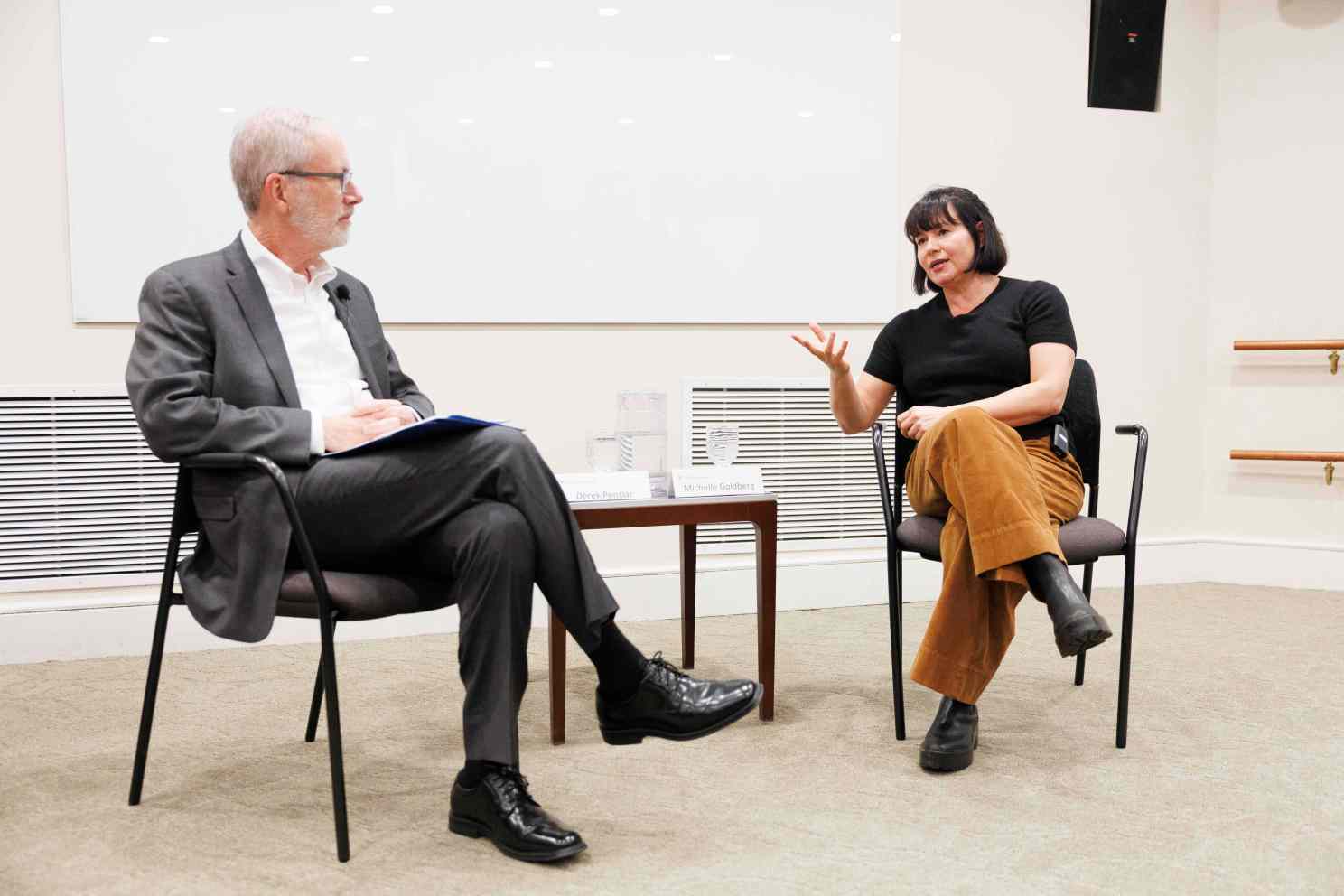Finding boundaries of debate

Derek Penslar and Michelle Goldberg.
Niles Singer/Harvard Staff Photographer
Times columnist Michelle Goldberg discusses Israel, social conservatism, immigration, and where free speech becomes something else
Anti-Zionism doesn’t top Michelle Goldberg’s list of fears.
“When I think about my future in the country, my family’s future in this country, I am so much more threatened by people who are opposed to pluralism,” said The New York Times columnist who describes herself as a secular Jew. “Our traditions of liberal pluralism are why Jews have thrived in the United States.”
Goldberg was on campus earlier this month for the 2025 Doft Lecture, hosted annually by the Center for Jewish Studies. Her wide-ranging conversation with center Director Derek J. Penslar, William Lee Frost Professor of Jewish History, covered everything from free speech to hate speech at an event titled “Authoritarianism, Antisemitism & the Future of America.”
Goldberg explained that she doesn’t necessarily equate anti-Zionism with antisemitism.
As she has noted in her work, trying to force Jewish Americans, with their deep cultural and religious attachments to Israel, to disavow the movement for a Jewish nation is unquestionably antisemitic. But some Israel critics like New York City mayoral candidate Zohran Mamdani have been unfairly tarred as antisemites, she said.
They can’t reconcile the Jewish state with their commitments to pluralism, Goldberg said. “They basically say every state should be a state for all of its citizens. You can argue with that. You can say it’s naïve. But I fundamentally do not find it threatening.”
Penslar observed how adept partisans are at identifying antisemitism in their political opponents. “Do you honestly believe that antisemitism is primarily on one side or the other?” he asked.
“I deeply, honestly believe it’s worse on the right,” Goldberg replied, citing Politico’s recent report on a leaked chat of Young Republicans leaders praising Hitler.
Goldberg later amended that. “I just think the antisemites on the left have dramatically less power,” she said.
Penslar asked where Goldberg draws the line between embracing viewpoint diversity and disavowing reprehensible ideas.
The Buffalo, N.Y., native whose political awakening came with pro-choice activism in the 1990s, spoke to the dangers of “artificially narrowing the boundaries of debate.” She cited her reporting on how experts’ refusal to engage with concerns about COVID vaccines turned everyday skeptics into hard-line opponents.
At the other extreme, she sees the right embracing an ethos of “just asking questions” to jump the old guardrails on political speech and advance prejudice and untruths.
“I don’t know that anybody can say, ‘Here’s where the boundary should be,” she said.
Noting the rise of support among some Hispanic Americans for Donald Trump in 2024, Penslar wondered whether the values of pluralism mandate political consideration for the social conservatism of that segment of the voting bloc. Goldberg suggested that certain policy goals, such as banning same-sex marriage or outlawing abortion, may be incompatible with democracy.
The issue of immigration is next-level tricky. “I think most Democrats probably see America giving asylum to refugees as something sacred and fundamental,” she said.
Maintaining that access, while addressing some citizens’ concerns with immigration system abuses, would require increased infrastructure and investments.
“It’s much easier for Republicans, who don’t care about those values in the first place, to just say, ‘We’re just going to shut it down,’” Goldberg said.
In the Q&A portion of the event, audience members and students solicited Goldberg’s thoughts on podcasting, polarized media, and where she sees distinctly American patterns in 21st-century attitudes toward Jewish populations.
“We are the country with the most Jews outside of Israel,” Goldberg said. There’s a “particular insult,” she continued, in attempts to dismantle institutions where Jewish Americans have historically thrived, like universities, “in the name of fighting antisemitism.”
Another audience member asked how much credit Trump deserves for brokering a ceasefire, however fragile, in Gaza, with the return of all living Israeli hostages. “A lot of credit,” she replied, but “not in the way certain people on the right are saying.”
This was essentially “the same formula” that was on the table in January, when President Joe Biden was still in office, she argued. Trump was able to land a deal by “force of personality, by not being bound to certain norms of American diplomacy.”
Today’s Republican Party also gives Trump enormous leeway to act as he pleases, Goldberg added. “I actually think if Biden had forced [Israeli Prime Minister Benjamin] Netanyahu to accept the exact same deal, the Republicans would be saying he had sold out Israel.”




